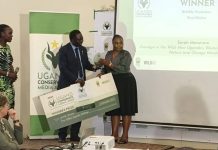By David Mwanje
United Bank for Africa (UBA) Uganda has placed financial literacy at the centre of its outreach, positioning money management skills as a practical tool for household resilience and long-term growth amid economic uncertainty.
UBA Uganda Chief Financial Officer Wycliffe Kyonga said financial literacy is “the gateway to financial independence,” urging Ugandans to move from survival habits to deliberate wealth creation through budgeting, saving and informed investing. “Financial literacy is more than understanding numbers,” Kyonga said. “It’s the power to plan, to invest wisely, and to build generational security.” He added that disciplined habits can turn modest incomes into lasting financial strength.
The bank says it is translating that message into action through community advisory hubs that explain credit scores, workshops on risk management, and mobile tools that help clients track expenses in real time. UBA frames the push as part of an inclusive banking approach, with products ranging from micro-savings accounts to digital investment portals aimed at small traders and corporate professionals alike.
Kyonga’s remarks track with recent policy signals. Bank of Uganda Governor Michael Atingi-Ego, speaking at the Opportunity International Agriculture Finance Summit on Aug. 12, 2025, called financial inclusion key to unlocking rural potential, particularly for smallholder farmers who make up roughly 70% of Uganda’s workforce. He advocated digital financial passports to build verifiable credit histories, calling the challenge “a trust problem,” and highlighted micro-insurance as a “triple dividend” that cushions climate shocks, sustains recovery and lowers borrowing costs. With the Agricultural Credit Facility holding a 1% NPL rate, he linked financial literacy to real-economy outcomes.
Finance Minister Matia Kasaija has also cast financial literacy as a pillar of national transformation. At the Uganda Financial Literacy Association (UFLA) launch at Hotel Africana on May 30, 2025, he spotlighted women as change agents. “My emphasis is on women,” he said. “They are very clever with money but unfortunately, many are not informed. Some still keep cash under the mattress or in boxes — that is not smart. The money can be stolen or even eaten by rats.” A day earlier, at the National Budget Month launch on May 29, 2025, at Uganda Media Centre, Kasaija pressed for public engagement and transparency: “It’s an opportunity for all stakeholders to understand what the approved budget entails and how it impacts their lives.” He tied financial awareness to Uganda’s long-term goal of expanding the economy from USD 50 billion to USD 500 billion, stressing efficient resource use and citizen participation.
In his June 12, 2025 Budget Speech at Kololo Independence Grounds, Kasaija flagged the digitalisation of the Parish Development Model (PDM) to ensure grants flow securely from the National Treasury to beneficiaries. With Shs 3.3 trillion already disbursed, the programme targets subsistence households transitioning into the money economy a practical example of the empowerment Kyonga describes.
UBA says its programmes AI-powered budgeting tools, financial literacy webinars and inclusive banking products are designed to help customers make informed choices and manage money better. “The sooner you begin, the stronger your foundation becomes,” Kyonga said. “Financial literacy isn’t just knowledge it’s the key to independence and prosperity.”
As Uganda pursues wider financial inclusion and digital growth, UBA’s efforts illustrate how banks can move beyond transactions to support behaviour change and long-term planning, one informed customer at a time.























